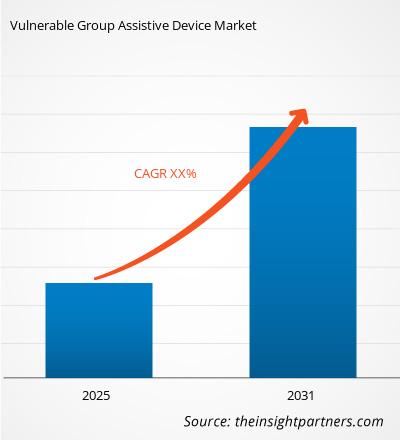MARKET INTRODUCTION
Assistive technology is a general term that comprises assistive, adaptive, and rehabilitative devices for people with disabilities and the method used in selecting, locating, and using them. People who have disabilities often have difficulty performing activities of daily living (ADLs) independently or even with assistance. Assistive technology encourages greater independence by enabling people to perform tasks they were formerly unable to achieve or had great difficulty achieving, providing enhancements to, or changing methods of interacting with, the technology needed to accomplish such tasks.
MARKET DYNAMICS
Factors driving the growth of the vulnerable groups' assistive devices market are rising in the aging population and an increase in non-communicable diseases. However, complex devices are likely to hamper the growth of the market. Moreover, technological advancements in the vulnerable groups' assistive devices are further likely to create growth opportunities in the market.
MARKET SCOPE
The "Vulnerable groups assistive devices Market Analysis to 2031" is a specialized and in-depth study of the healthcare industry with a special focus on the global market trend analysis. The report aims to provide an overview of vulnerable groups assistive devices market with detailed market segmentation by type, and end use. The vulnerable groups assistive devices market is expected to witness high growth during the forecast period. The report provides key statistics on the market status of the leading players in vulnerable groups assistive devices market and offers key trends and opportunities in the market.
MARKET SEGMENTATION
The vulnerable groups assistive devices market is segmented on the basis of type, and end use. On the basis of type, the market is categorized as hearing aids, medical mobility aids and ambulatory devices, vision and reading aids, medical furniture and bathroom safety products. On the basis of end use, the market is categorized as for elderly, for disabled, others.
REGIONAL FRAMEWORK
The report provides a detailed overview of the industry including both qualitative and quantitative information. It provides overview and forecast of the vulnerable groups assistive devices market based on various segments. It also provides market size and forecast estimates from year 2021 to 2031 with respect to five major regions, namely; North America, Europe, Asia-Pacific (APAC), Middle East and Africa (MEA) and South & Central America. The vulnerable groups assistive devices market by each region is later sub-segmented by respective countries and segments. The report covers analysis and forecast of 18 countries globally along with current trend and opportunities prevailing in the region.
The report analyzes factors affecting vulnerable groups assistive devices market from both demand and supply side and further evaluates market dynamics affecting the market during forecast period i.e., drivers, restraints, opportunities, and future trend. The report also provides exhaustive PEST analysis for all five regions namely; North America, Europe, APAC, MEA and South & Central America after evaluating political, economic, social and technological factors effecting the vulnerable groups assistive devices market in these regions.
MARKET PLAYERS
The report covers key developments in the vulnerable groups assistive devices market as organic and inorganic growth strategies. Various companies are focusing on organic growth strategies such as product launches, product approvals and others such as patents and events. Inorganic growth strategies witnessed in the market were acquisitions, and partnership & collaborations. These activities have paved way for expansion of business and customer base of market players. The market players from vulnerable groups assistive devices market are anticipated to have lucrative growth opportunities in the future with the rising demand for vulnerable groups assistive devices in the global market. Below mentioned is the list of few companies engaged in the vulnerable groups assistive devices market.
The report also includes the profiles of key players in vulnerable groups assistive devices market along with their SWOT analysis and market strategies. In addition, the report focuses on leading industry players with information such as company profiles, products and services offered, financial information of last 3 years, key development in past five years.
- Sonova Holding
- William Demant
- Invacare
- Ottobock
- Starkey
- GN ReSound
- Sivantos
- Cochlear
- Widex
- Sunrise Medical
The Insight Partner's dedicated research and analysis team consists of experienced professionals with advanced statistical expertise and offers various customization options in the existing study.
Vulnerable Group Assistive Device Report Scope
| Report Attribute | Details |
|---|---|
| Market size in 2024 | US$ XX million |
| Market Size by 2031 | US$ XX Million |
| Global CAGR (2025 - 2031) | XX% |
| Historical Data | 2021-2023 |
| Forecast period | 2025-2031 |
| Segments Covered |
By Dosage Form
|
| Regions and Countries Covered | North America
|
| Market leaders and key company profiles |
- Historical Analysis (2 Years), Base Year, Forecast (7 Years) with CAGR
- PEST and SWOT Analysis
- Market Size Value / Volume - Global, Regional, Country
- Industry and Competitive Landscape
- Excel Dataset

Report Coverage
Revenue forecast, Company Analysis, Industry landscape, Growth factors, and Trends

Segment Covered
This text is related
to segments covered.

Regional Scope
North America, Europe, Asia Pacific, Middle East & Africa, South & Central America

Country Scope
This text is related
to country scope.
Trends and growth analysis reports related to Life Sciences : READ MORE..
The List of Companies
1. Sonova Holding
2. William Demant
3. Invacare
4. Ottobock
5. Starkey
6. GN ReSound
7. Sivantos
8. Cochlear
9. Widex
10. Sunrise Medical
11. Permobil Corp
12. MED-EL
13. Pride Mobility
1. Sonova Holding
2. William Demant
3. Invacare
4. Ottobock
5. Starkey
6. GN ReSound
7. Sivantos
8. Cochlear
9. Widex
10. Sunrise Medical
11. Permobil Corp
12. MED-EL
13. Pride Mobility



 Get Free Sample For
Get Free Sample For